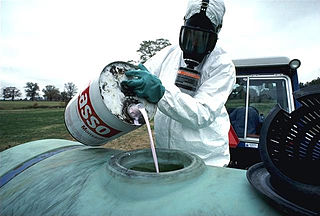
Pesticides are substances that are meant to control pests, including weeds. The term pesticide includes all of the following: herbicide, insecticides nematicide, molluscicide, piscicide, avicide, rodenticide, bactericide, insect repellent, animal repellent, antimicrobial, and fungicide. The most common of these are herbicides which account for approximately 80% of all pesticide use. Most pesticides are intended to serve as plant protection products, which in general, protect plants from weeds, fungi, or insects.

Organophosphates (also known as phosphate esters, or OPEs) are a class of organophosphorus compounds with the general structure O=P(OR)3. They can be considered as esters of phosphoric acid. Like most functional groups organophosphates occur in a diverse range of forms, with important examples including key biomolecules such as DNA, RNA and ATP, as well as many insecticides, herbicides, nerve agents and flame retardants.
Defence Science and Technology is part of the Australian Department of Defence dedicated to providing science and technology support for Australia's defence and national security needs. It is Australia's second largest government-funded science organisation after the CSIRO. The agency's name was changed from Defence Science and Technology Organisation (DSTO) to Defence Science and Technology on 1 July 2015.
The Agricultural Marketing Service (AMS) is an agency within the United States Department of Agriculture, and has programs in five commodity areas: cotton and tobacco; dairy; fruit and vegetable; livestock and seed; and poultry. These programs provide testing, standardization, grading and market news services for those commodities, and oversee marketing agreements and orders, administer research and promotion programs, and purchase commodities for federal food programs. The AMS enforces certain federal laws such as the Perishable Agricultural Commodities Act and the Federal Seed Act. The AMS budget is $1.2 billion.
Pesticide residue refers to the pesticides that may remain on or in food after they are applied to food crops. The maximum allowable levels of these residues in foods are often stipulated by regulatory bodies in many countries. Regulations such as pre-harvest intervals also often prevent harvest of crop or livestock products if recently treated in order to allow residue concentrations to decrease over time to safe levels before harvest. Exposure of the general population to these residues most commonly occurs through consumption of treated food sources, or being in close contact to areas treated with pesticides such as farms or lawns.

The Central Science Laboratory (CSL) was an executive agency of the UK government branch, the Department for Environment, Food and Rural Affairs (DEFRA). It is now part of the Food and Environment Research Agency, which is in turn part of DEFRA.

Cyromazine is a triazine insect growth regulator used as an insecticide and an acaricide. It is a cyclopropyl derivative of melamine. Cyromazine works by affecting the nervous system of the immature larval stages of certain insects.

Food contamination refers to the presence of harmful chemicals and microorganisms in food, which can cause consumer illness. This article addresses the chemical contamination of foods, as opposed to microbiological contamination, which can be found under foodborne illness.

Organophosphate poisoning is poisoning due to organophosphates (OPs). Organophosphates are used as insecticides, medications, and nerve agents. Symptoms include increased saliva and tear production, diarrhea, vomiting, small pupils, sweating, muscle tremors, and confusion. While onset of symptoms is often within minutes to hours, some symptoms can take weeks to appear. Symptoms can last for days to weeks.
Toxicology testing, also known as safety assessment, or toxicity testing, is conducted to determine the degree to which a substance can damage a living or non-living organisms. It is often conducted by researchers using standard test procedures to comply with governing regulations, for example for medicines and pesticides. Much toxicology is considered to be part of the field of preclinical development. Stages of in vitro and in vivo research are conducted to determine safe doses of exposure in humans before a first-in-man study. Toxicology testing may be conducted by the pharmaceutical industry, biotechnology companies or contract research organizations.
Expenditures by federal and provincial organizations on scientific research and development accounted for about 10% of all such spending in Canada in 2006. These organizations are active in natural and social science research, engineering research, industrial research and medical research.
Defence Research & Development Establishment (DRDE) is an Indian defence laboratory of the Defence Research and Development Organisation (DRDO). Located in Gwalior, it is primarily involved in the research and development of detection and protection against toxic chemical and biological agents. DRDE is organised under the Life Sciences Directorate of DRDO. The present director of DRDE is Dr. Devendra Kumar Dubey.

The impact of pesticides consists of the effects of pesticides on non-target species. Pesticides are chemical preparations used to kill fungal or animal pests. Over 98% of sprayed insecticides and 95% of herbicides reach a destination other than their target species, because they are sprayed or spread across entire agricultural fields. Runoff can carry pesticides into aquatic environments while wind can carry them to other fields, grazing areas, human settlements and undeveloped areas, potentially affecting other species. Other problems emerge from poor production, transport and storage practices. Over time, repeated application increases pest resistance, while its effects on other species can facilitate the pest's resurgence.

Clothianidin is an insecticide developed by Takeda Chemical Industries and Bayer AG. Similar to thiamethoxam and imidacloprid, it is a neonicotinoid. Neonicotinoids are a class of insecticides that are chemically similar to nicotine, which has been used as a pesticide since the late 1700s. Clothianidin and other neonicotinoids act on the central nervous system of insects as an agonist of acetylcholine, the neurotransmitter that stimulates nAChR, targeting the same receptor site (AChR) and activating post-synaptic acetylcholine receptors but not inhibiting AChE. Clothianidin and other neonicotinoids were developed to last longer than nicotine, which is more toxic and which breaks down too quickly in the environment. However, studies published in 2012 show that neonicotinoid dust released at planting time may persist in nearby fields for several years and be taken up into non-target plants, which are then foraged by bees and other insects.

The National Institute of Molecular Biology and Biotechnology, also known as NIMBB, is a research institute of the University of the Philippines. It has four branches which are located in UP Diliman (NIMBB-Diliman), UP Los Baños (BIOTECH-UPLB), UP Manila and UP Visayas.
Pesticides in the United States are used predominantly by the agricultural sector, but approximately a quarter of them are used in houses, yards, parks, golf courses, and swimming pools.

The California Department of Pesticide Regulation, also known as DPR or CDPR, is one of six boards and departments of the California Environmental Protection Agency (Cal/EPA).
Craven Laboratories was an American research company based in Austin, Texas.
The Department of Plant Protection (DPP) is a department of the Ministry of National Food Security and Research of the Government of Pakistan. It works under the following pieces of legislation and regulation of the Government of Pakistan: (i) Plant Quarantine Act 1976 (ii) Agricultural Pesticide Rules and (iii) Agricultural Pesticide Ordinance.









